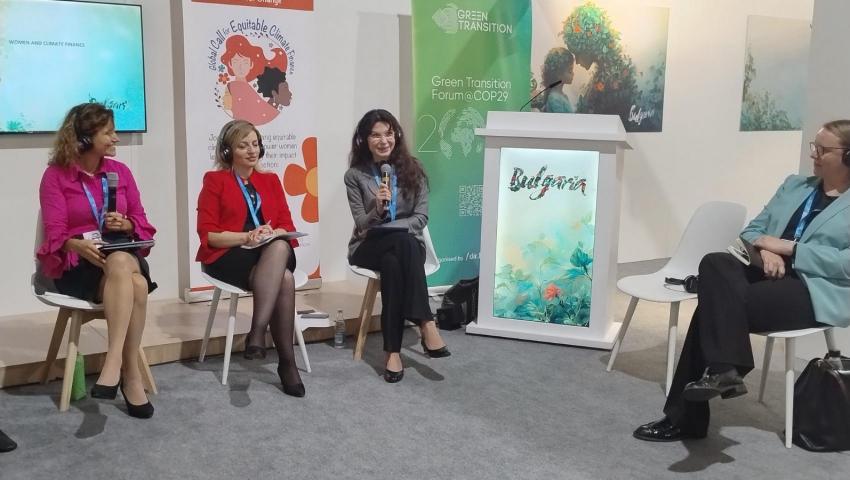Reneta Koleva: Bulgaria will develop its own action plan for the Climate Social Fund of the EU

Deputy Minister Reneta Koleva participated in a discussion at the Bulgarian pavilion on the role of women in the financing of climate policies.
Bulgaria, as a member of the European Union, is part of a community that has set itself one of the most ambitious climate goals on a global scale with the commitment to achieve zero net emissions by 2050. This was recalled to BTA by the Acting Deputy Minister of Environment and Water Reneta Koleva at the COP29 climate conference in Baku. A little earlier, she participated in the Green Transition Forum at the Bulgarian pavilion in the Azerbaijani capital. This was a debut for the GT forum at the global climate meeting, and climate finance and the role of women entrepreneurs were discussed at the Bulgarian pavilion.
According to Deputy Minister Koleva, a reduction in pollution by the major emitting countries should be agreed upon, which would make it possible to limit the warming of the climate to 1.5 degrees Celsius compared to the pre-industrial era. The other goal is to provide more serious funding for the countries that are most affected by the consequences of climate change, for example small island states, noted Deputy Minister Koleva.
According to her, the goals of preserving water resources, food security and, last but not least, the well-being of people and human health are also important for our country.
We are seeing a reduction in emissions, but achieving the pan-European goal of reducing them by 55 percent by 2030 compared to 1990 levels remains a challenge that requires a lot of effort and strategic, national-level measures in terms of energy, transport, mobility. , agriculture as sectors. One of the tools in this direction is the European emissions trading scheme, and the new regulations now include the building stock and transport.
In this context, a more specific challenge for our country at the moment is the development by June 2025 of a national action plan under the EU's Social Climate Fund.
This fund will provide funds to member countries through targeted funding, so that the most vulnerable groups affected, such as households in energy or transport poverty, are directly supported and do not fall behind in the green transition, according to information from the European Commission.
We are talking about a resource of 2.5 billion euros from the EU and an additional 25 percent national co-financing, aimed at improving the building stock and reducing emissions from transport, as well as supporting energy-poor households and micro-enterprises, explained Deputy Minister Koleva.
SOR29 is called the "financial CCP" and providing more funding for vulnerable countries and groups by attracting a larger number of partners is extremely important, the deputy minister pointed out.
A special event at the Bulgarian pavilion was aimed at women, who, together with children, are one of the groups most affected by climate change.
A mark of the development of a society is its attitude towards vulnerable groups. For women on a global scale, according to a UN report, 0.01 percent of funding for projects is allocated, and in Europe - 2 percent, recalled the acting deputy minister.
Although Bulgaria is among the countries at the forefront of equality between men and women, there is still much to strive for, including the creation of a favorable working environment and equalization of remuneration, she noted.
From an institutional point of view, cooperation and coordination between individual departments is of primary importance for climate policy, regardless of whether this policy is the responsibility of an individual ministry or is among the portfolios of a wider structure, such as the Ministry of Environment and Water (MoEW) is currently. The last year's expansion of the administrative capacity within the Ministry of Education, Culture and Science, including by means of foreign experts on the territory of the country, whose activity is aimed at working with the municipalities, considering their active participation, necessary in the development of the programs for adaptations and mitigating the consequences of climate change, also supports our country's activities in the field of climate policy, added Deputy Minister Koleva.
For the second year, the Ministry of Environment and Water (MoEW) is the co-organizer of the events of the Bulgarian pavilion, representing our country at the global forum.
